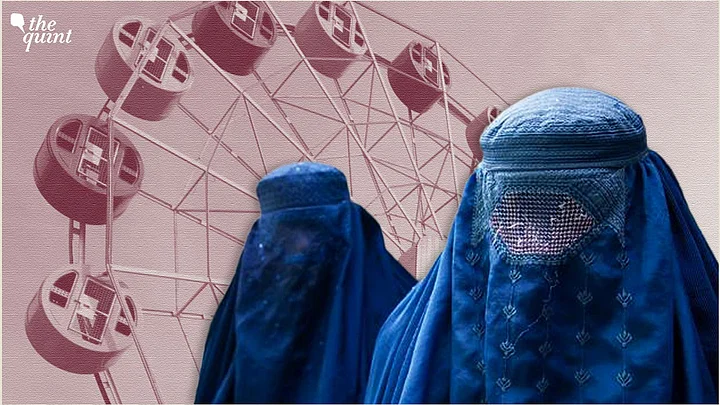Afghan women were dealt yet another body blow by the Taliban regime which declared that women were not observing the hijab regulations inside parks in the prescribed manner and hence, would be forbidden from entering such recreation spots.
Mohammad Khaled Hanafi – Afghanistan’s acting minister of virtue and vice – made this announcement on 26 August after noticing the 'transgression’ by some women at the well-known Band-e-Amir National Park.
He further added that it "was not obligatory” to visit parks for sightseeing and that a solution would soon be found – presumably one that would place further fetters on the hapless women and girl children of Afghanistan who are already reeling under the gender apartheid policies of the Taliban.
Ironically, this draconian restriction was announced on a day – traditionally celebrated in the USA as 'Women’s Equality Day' – to commemorate the granting of voting rights to women in 1920.
Women Remain a Target of the Taliban
Multiple ironies and tragedies mark the plight of the Afghan people and women in particular since the Taliban returned to power in Kabul in August 2021.
Over the last two years, it is evident that the Afghan issue has gone off the radar of the major powers, and barring anodyne references at multilateral summits and at the UN that are made periodically – the women of Afghanistan have been abandoned to the misogynistic mercy of the Taliban regime.
The shambolic US withdrawal announced by President Joe Biden soon after he assumed office – was symptomatic of this costly US fatigue and a cynical acceptance by the White House that despite the blood and treasure expended since October 2001, socio-cultural rhythm change in Afghanistan was not a feasible proposition.
Equitable gender practices that made a promising start after the US installed a 'democratic’ government were soon buried by the Taliban when they seized power.
Liberal voices within Afghanistan have been stifled – in extreme cases, even killed – and there is no discernible light at the end of the tunnel.
Afghanistan Isn’t Brought Up in BRICS
In keeping with this erasure of the Afghan woman from the larger global consciousness, it was both intriguing and disappointing that there was no reference at all to Afghanistan in the recently concluded BRICS summit in South Africa.
The 94-paragraph document comprising 9276 words touched upon various issues and some of the troubled conflict-ridden regions of the world – but Afghanistan was missing.
It merits recall that at the BRICS 2021 summit chaired by India, Afghanistan received empathetic notice from the five-member group (Brazil, Russia, China, and South Africa being the other four), and at that time, the leaders sought an "inclusive intra-Afghan dialogue so as to ensure stability, civil peace, law, and order."
The 2021 declaration also emphasised the need to "address the humanitarian situation and to uphold human rights, including those of women, children, and minorities."
The 2022 BRICS summit chaired by China devoted a whole paragraph to the Afghan issue and noted: “We strongly support a peaceful, secure, and stable Afghanistan while emphasizing the respect for its sovereignty, independence, territorial integrity, national unity, and non-interference in its internal affairs. We emphasise the need for all sides to encourage the Afghanistan authorities to achieve national reconciliation through dialogue and negotiation, and to establish a broad-based inclusive, and representative political structure. We reaffirm the significance of relevant UNSC resolutions."
It also states, "We emphasise that the Afghan territory not to be used to threaten or attack any country or to shelter or train terrorists, or to plan to finance terrorist acts, and reiterate the importance of combating terrorism in Afghanistan. We call on the Afghanistan authorities to work towards combating drug-related crime to free Afghanistan from the scourge of drugs. We stress the need to provide urgent humanitarian assistance to the Afghan people and to safeguard the fundamental rights of all Afghans, including women, children, and different ethnic groups.”
Sidestepping the Afghan Issue
The SCO (Shanghai Cooperation Organisation) which has a regional and counter-terrorism focus has in the past, taken note of the intractable Afghan issue at its summits and it is instructive that India, Russia, and China are the three major nations who are part of both BRICS and the SCO.
While they have provided bilateral support to Afghanistan over the decades, there has been no RIC (Russia, India, China) consensus about harmonisng their efforts in a tangible manner to realise their declaratory positions – particularly as related to the contentious issue of Afghan gender equity.
While it may be argued that South Africa as the 2023 BRICS chair would prioritise those issues more relevant to its geopolitics, it cannot be denied that between them, the three RIC nations abandoned the Afghan issue in their deliberations.
With India preparing to host the G20 summit from 8 to 10 September, one hopes that there will be the appropriate degree of high-level political attention accorded to Afghanistan and its stoic women who have borne the brunt of cruel and grossly iniquitous gender policies.
The brave women teachers in Afghanistan who continue to teach the girl child secretly despite the Taliban diktat merit a salute for keeping the flickering flame alive. Their plight and resolve should not be erased from the collective global memory.
(Commodore C Uday Bhaskar, Director, Society for Policy Studies, has the rare distinction of having headed three think tanks. He was previously Director at the National Maritime Foundation (2009-11) and the Institute for Defence Studies and Analyses (2004-05). He tweets @theUdayB. This is an opinion piece. The views expressed above are the author’s own. The Quint neither endorses nor is responsible for them.)
